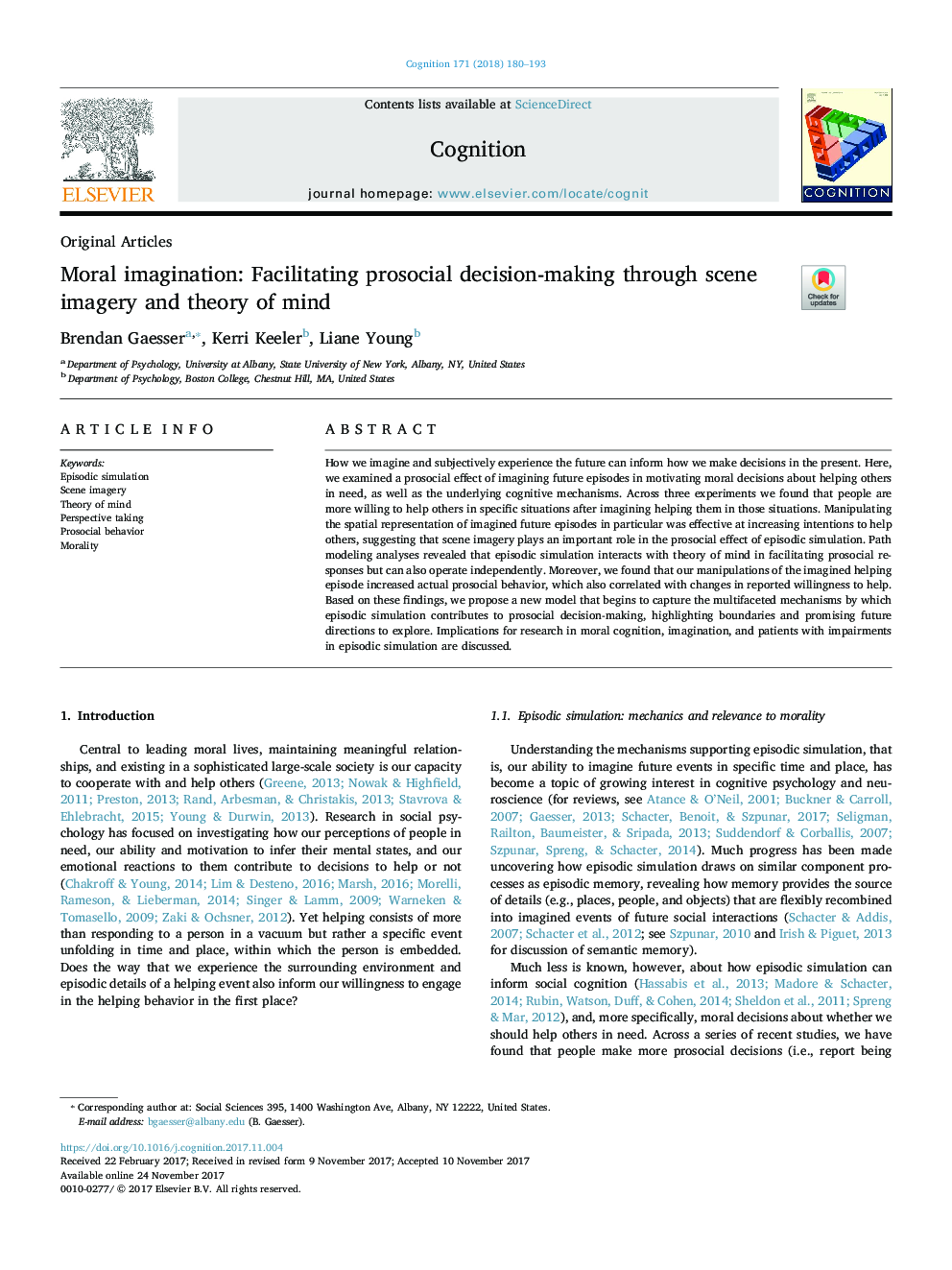| کد مقاله | کد نشریه | سال انتشار | مقاله انگلیسی | نسخه تمام متن |
|---|---|---|---|---|
| 7285638 | 1474096 | 2018 | 14 صفحه PDF | دانلود رایگان |
عنوان انگلیسی مقاله ISI
Moral imagination: Facilitating prosocial decision-making through scene imagery and theory of mind
ترجمه فارسی عنوان
تخیل اخلاقی: تسهیل تصمیم گیری های جنسی از طریق تصاویر صحرایی و نظریه ذهن
دانلود مقاله + سفارش ترجمه
دانلود مقاله ISI انگلیسی
رایگان برای ایرانیان
کلمات کلیدی
شبیه سازی اپیزودیک، تصاویر صحنه، نظریه ذهن، چشم انداز، رفتار طرفدار اخلاق،
ترجمه چکیده
چگونه ما تصور می کنیم و به لحاظ ذهنی تجربه آینده می تواند به ما اطلاع دهد که چگونه ما تصمیم گیری در حال حاضر. در اینجا، ما یک اثر مثبت تصورات قسمت های آینده را در انگیزه دادن تصمیمات اخلاقی در مورد کمک به دیگران که نیاز دارند، و همچنین مکانیسم های شناختی پایه بررسی می کنیم. در سه آزمایش، ما متوجه شدیم که مردم پس از تصور کمک به آنها در این شرایط، بیشتر مایل به کمک به دیگران در شرایط خاص هستند. دستکاری نمایشی فضایی از قسمت های آینده تصور شده به طور خاص در افزایش اهداف برای کمک به دیگران موثر بود، و پیشنهاد می کند که تصاویر صحنه نقش مهمی در اثر مشروطیت شبیه سازی اپیزودیک دارند. تجزیه و تحلیل مدل سازی مسیر نشان داد که شبیه سازی اپیزودیک با تئوری ذهن در تسهیل پاسخ های مستقل ارتباط برقرار می کند اما همچنین می تواند مستقل عمل کند. علاوه بر این، ما متوجه شدیم که دستکاری ما در مورد قسمت تصور شده، باعث افزایش رفتار واقعی طرفدارانه می شود، که همچنین با تغییرات در تمایل گزارش شده به کمک، مرتبط است. بر اساس این یافته ها، ما یک مدل جدید را پیشنهاد می کنیم که مؤلفه های چند وجهی را جذب می کند که از طریق آن شباهت های اپیزودیک به تصمیم گیری های اجباری، برجسته کردن مرزها و نوید دادن به جهت های آینده برای کشف کمک می کند. معیارهای تحقیق در شناخت اخلاقی، تخیل و بیماران مبتلا به اختلالات در شبیه سازی اپیزودیک مورد بحث قرار گرفته است.
موضوعات مرتبط
علوم زیستی و بیوفناوری
علم عصب شناسی
علوم اعصاب شناختی
چکیده انگلیسی
How we imagine and subjectively experience the future can inform how we make decisions in the present. Here, we examined a prosocial effect of imagining future episodes in motivating moral decisions about helping others in need, as well as the underlying cognitive mechanisms. Across three experiments we found that people are more willing to help others in specific situations after imagining helping them in those situations. Manipulating the spatial representation of imagined future episodes in particular was effective at increasing intentions to help others, suggesting that scene imagery plays an important role in the prosocial effect of episodic simulation. Path modeling analyses revealed that episodic simulation interacts with theory of mind in facilitating prosocial responses but can also operate independently. Moreover, we found that our manipulations of the imagined helping episode increased actual prosocial behavior, which also correlated with changes in reported willingness to help. Based on these findings, we propose a new model that begins to capture the multifaceted mechanisms by which episodic simulation contributes to prosocial decision-making, highlighting boundaries and promising future directions to explore. Implications for research in moral cognition, imagination, and patients with impairments in episodic simulation are discussed.
ناشر
Database: Elsevier - ScienceDirect (ساینس دایرکت)
Journal: Cognition - Volume 171, February 2018, Pages 180-193
Journal: Cognition - Volume 171, February 2018, Pages 180-193
نویسندگان
Brendan Gaesser, Kerri Keeler, Liane Young,
